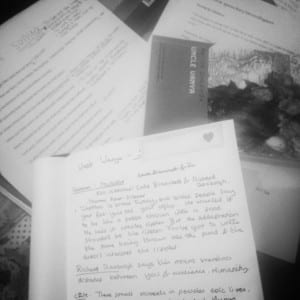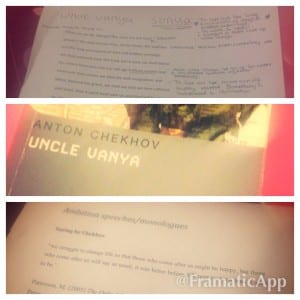Has Time Ever Changed?
Something that began to inspire me at the beginning of our process, was this  quote, said by Chekhov:
quote, said by Chekhov:
“We struggle to change life so that those who come after us might be happy, but those who come after us will say as usual, it was better before, life now is worst than it used to be.”
(Patterson, 2005). Chekhov was suggesting that we try to make things better to make everyone, including ourselves, happier. However no one will ever be happier as they will always want and expect more. They will always look back on the past thinking it was better, instead of being positive and looking at the future. This was said a long time ago, but is still relevant today, I began to question whether generations after generations people had really changed or not. I came to realise that with every single piece of existing text which we’ve found, whether it be modern day song lyrics, Shakespeare’s words, famous speeches, they can all still be relevant in this day of age. This made me query whether things have really changed throughout these time leaps. Of course they have in cases, we have come a long way, however at the same time we really haven’t, these texts can still be very relevant, especially when the context was changed.
Although we haven’t used Chekhov within our piece, this was something that inspired me early on in our piece and contributed to inspiration for the peformance. I looked at some of Chekhov’s work,
“Chekhov’s plays stand as powerful statements that at least to the fact that things were never better, and that hope for the future matters more than anything.”
(Patterson, 2005). I came to realise that this is an aspect of our performance “Take Me By The Tongue”. Although this is fiction, maybe the reason his work can be connected to so easily is because “Chekhov claims to represent the world as it is, without moral judgments. Most of the climactic action in his works takes place offstage, often before the beginning of the play.” (Lewis). Because to this his work can seem really real and very realistic and therefore relatable. Our performance isn’t realistic, but it should be relatable. If you can relate and engage with it, then you can question more topics.
I was really inspired by his play Uncle Vanya, particularly the last speech of Sonya’s, where she comes to realise that the rest of her life will consist of having to
“labour for others from now into our old age without respite… throughout the long days and endless evenings…”
(Chekhov, Frayn, 1988, 59). I felt connected towards this character, and that people could still easily understand and relate to her, even though this was written over two hundred years ago and set in Russia. This began my process of understanding that with a majority of texts that we are looking at, the older ones are still relevant today, in one way or another. I questioned whether the modern texts will therefore still be relevant, say in 100 years to come, will people have changed? Or will we still have the same problems which are currently here today. This was the main inspiration for me as a performer, looking at the way some things haven’t changed, and the idea of having hope and positivitys for the future.
Works Cited
Patterson, M. (2005) The Oxford Dictionary of Plays. Oxford: Oxford University Press.
Chekhov, A. Trans, Frayn, M. (1988) Uncle Vanya. London: Methuen Publishing Ltd.
Lewis, P. Anton Chekhov.[Online] The Modern Lab at Yale University. Available from: http://modernism.research.yale.edu/wiki/index.php/Anton_Chekhov [Accessed 27 May].
